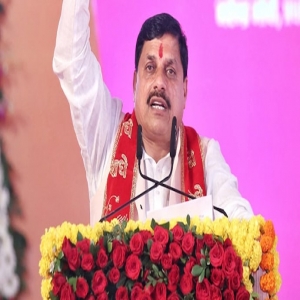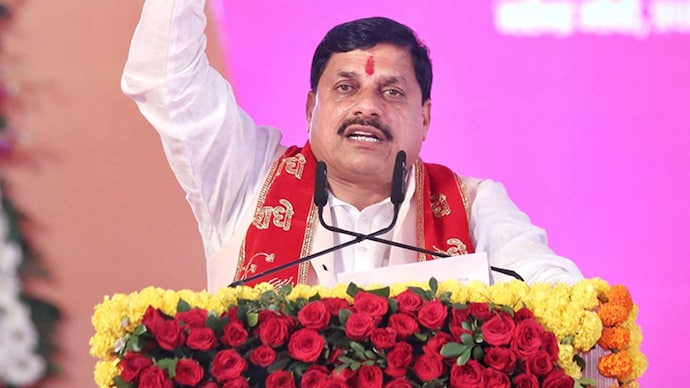
.png) Jacob Peenikaparambil
Jacob Peenikaparambil

Madhya Pradesh Chief Minister Mohan Yadav seems eager to win favour with the Sangh Parivar, competing with leaders like Yogi Adityanath of Uttar Pradesh and Himanta Biswa Sarma of Assam in devising divisive strategies aimed at minorities, particularly Muslims. Soon after assuming office, his government used bulldozers to demolish homes and shops owned by Muslims accused of certain crimes. Last December, as part of an "intensive campaign" against the "illegal purchase and sale of meat," 10 meat shops in Bhopal were shut down. On the same day, the houses of three men accused of assaulting a BJP worker were also demolished.
Yadav's latest move is a proposal to ban the sale and consumption of meat and alcohol in holy towns along the Narmada River. According to a report by the news agency PTI, in a meeting on Friday, August 13, Yadav said, "It must be ensured that meat and liquor are not consumed in and around religious towns and places located on the banks of the Narmada River." The Narmada flows through 21 districts, 68 tehsils, 1,138 villages, and 1,126 ghats, hosting 430 ancient Shiva temples and two 'Shakti Peeths.' However, it remains unclear which towns along the river have been declared "religious" by the government.
At a cabinet committee meeting tasked with ensuring the cleanliness and continuous flow of the Narmada, Yadav stressed that no sewage should be discharged into the river from its source in Amarkantak throughout its course in the state. Efforts to clean the river are commendable, and the local population should support the government's initiatives to prevent pollution, especially the release of sewage.
However, it's puzzling how the consumption of meat and alcohol in towns along the Narmada is linked to river pollution. Notably, fish, a non-vegetarian food, is not banned, raising suspicions that the meat ban is selectively targeting Muslims. Since many involved in the meat business are Muslims, the BJP government seems intent on undermining their livelihoods. In contrast, fishing is predominantly carried out by Hindus, often from lower castes. The ban, therefore, seems driven less by spiritual or environmental concerns and more by a desire to appease the majority community and build a religion-based vote bank. Perhaps Mohan Yadav wants to outshine figures like Yogi Adityanath and Himanta Biswa Sarma in his Hindutva stance.
It's difficult to understand why BJP governments are so determined to impose meat bans in certain towns. According to a 2023 Pew Research Centre survey, only 39% of Indian adults identify as vegetarian. People's food habits largely depend on the availability of local produce, with Bengali Brahmins eating fish and meat and Kashmiri Brahmins similarly including meat in their diet. Banning food items that are not harmful to health infringes upon people's fundamental rights to life and freedom.
Meat bans disproportionately affect the poor, many of whom depend on raising goats and chickens for their livelihood. By prohibiting meat sales in towns along the Narmada, the government is depriving these people of their income, violating their constitutional right to life.
The proposed liquor ban, if enforced, could benefit all communities. However, past experiences in states that have implemented prohibition have been mixed. Liquor bans often lead to the illicit sale of alcohol and other corrupt practices, as liquor remains available to those willing to pay a premium. Under NT Rama Rao, Andhra Pradesh introduced prohibition with much fanfare, but the next government later reversed the policy. Similarly, it has been reported that the Nitish Kumar government in Bihar is reconsidering its prohibition policy. Instead of imposing bans, the government should focus on raising awareness about the harmful effects of alcohol consumption.
After failing to secure an absolute majority in the 2024 Lok Sabha elections, the BJP seems more aggressive in implementing its divisive and punitive Hindutva agenda. This is evident in the increase in hate speech by Sangh Parivar leaders, particularly BJP chief ministers, continued lynching by cow vigilantes, the rise of "bulldozer justice," and favouritism toward the majority community by promoting religious practices at the expense of the state exchequer. For instance, the Madhya Pradesh government mandated the celebration of Krishna Janmashtami in all government and public schools this year, a clear violation of the secular principles enshrined in the Indian Constitution.
The BJP government in Madhya Pradesh has also been targeting Christian educational institutions by filing false cases against them. On May 27, state police arrested 22 people, including the bishop of Jabalpur's Church of North India, a Catholic priest, and three pastors, accusing them of charging exorbitant fees. In the past, federal and state child rights officials have raided Christian schools and orphanages, filing cases against church officials under the state's stringent anti-conversion laws. As a result, many hostels for underprivileged children run by church organisations in Madhya Pradesh have been forced to close, causing students to drop out of school. The BJP government seems indifferent to the education of the poor, prioritising the Hindutva agenda instead.
It is to be noted that Madhya Pradesh's Human Development Index (HDI) performance lags behind that of many other Indian states. A lower life expectancy, low literacy rate, relatively lower per capita income, a high infant and maternal mortality rate, relatively high level of poverty and gender inequality make MP one of the least developed states in terms of human development. MP ranked 32 among 35 states and Union Territories in terms of Human Development in 2021. Instead of investing resources, energy and time in improving the standard of living of people, especially the poor, the MP government appears to be focusing on emotive issues by using religion as opium.
The BJP, both at the centre and in the states, seems to be devoid of any creative policy to solve the problems of people like skyrocketing unemployment, increasing atrocities on women and scheduled castes and scheduled tribes and the alarming increase in wealth inequality. As reported in the media, 3,95,000 candidates applied for sweepers' jobs for a salary of 15,000 rupees per month in Haryana. The candidates included 6,112 postgraduates, 39,990 graduates and 1,17,144 who had completed the twelfth standard. It is difficult for a party that is motivated by an ideology of exclusion, division and hatred towards minorities to be creative. Therefore, the BJP often resorts to communal and divisive strategies to win elections and to remain in power.
The Congress opposition in Madhya Pradesh lacks the courage to challenge the BJP's anti-minority policies. Jitu Patwari, president of the Madhya Pradesh Congress, called the ban on meat in Narmada towns a "sacred" initiative. Another Congress leader, Mukesh Nayak, stated, "If any such decision impedes the constitutional freedom of the people, it will cause suffocation among the people, and the result will not be good for the ruling party." However, other senior Congress leaders refused to comment, fearing the BJP would politicise the issue.
The Congress has not learned from its failed attempts at "soft Hindutva" during the 2023 assembly elections. Leaders like Kamal Nath of Madhya Pradesh and Bhupesh Baghel of Chhattisgarh tried to woo Hindu voters by mimicking the BJP's Hindutva strategies, only to fail miserably. Although Rahul Gandhi has been vocal in exposing the hate-driven policies of the RSS and BJP, many Congress leaders remain hesitant to speak out against the Hindutva agenda, especially when it involves attacks on minorities.
The inconsistency between the words of Sangh Parivar leaders and the actions of their members is glaring. While RSS chief Mohan Bhagwat recently said that "being Hindu means being generous and harboring goodwill toward everyone, regardless of their religious beliefs, caste, or dietary practices," hate against minorities continues to be spread by BJP IT cells and Sangh Parivar members. Bhagwat's ideal of a liberal and accepting Hinduism seems at odds with the reality of lynchings by cow vigilantes, bulldozer justice, and a lack of dialogue between the Sangh Parivar and minority communities.
Bhagwat's call for Hindus to protect the weak and promote harmony, equality, and charity may resonate with many Hindus, but the Sangh Parivar operates contrary to these ideals. If Bhagwat is sincere, he must lead efforts to reinvent the RSS, which is approaching its centenary in 2025. The organisation needs to abandon its hostility toward Muslims and Christians, publicly reject the idea that "Muslims, Christians, and Communists are India's enemies" (as stated by MS Golwalkar in Bunch of Thoughts), and embrace the core values of the Indian Constitution, particularly secularism. Converting India into a Hindu Rashtra is at odds with both the Constitution and the nation's rich, pluralistic heritage.
If Mohan Bhagwat succeeds in transforming the RSS into a positive, inclusive and unifying force, India's future could indeed be bright, allowing it to emerge as a true global leader or Vishwa Guru.